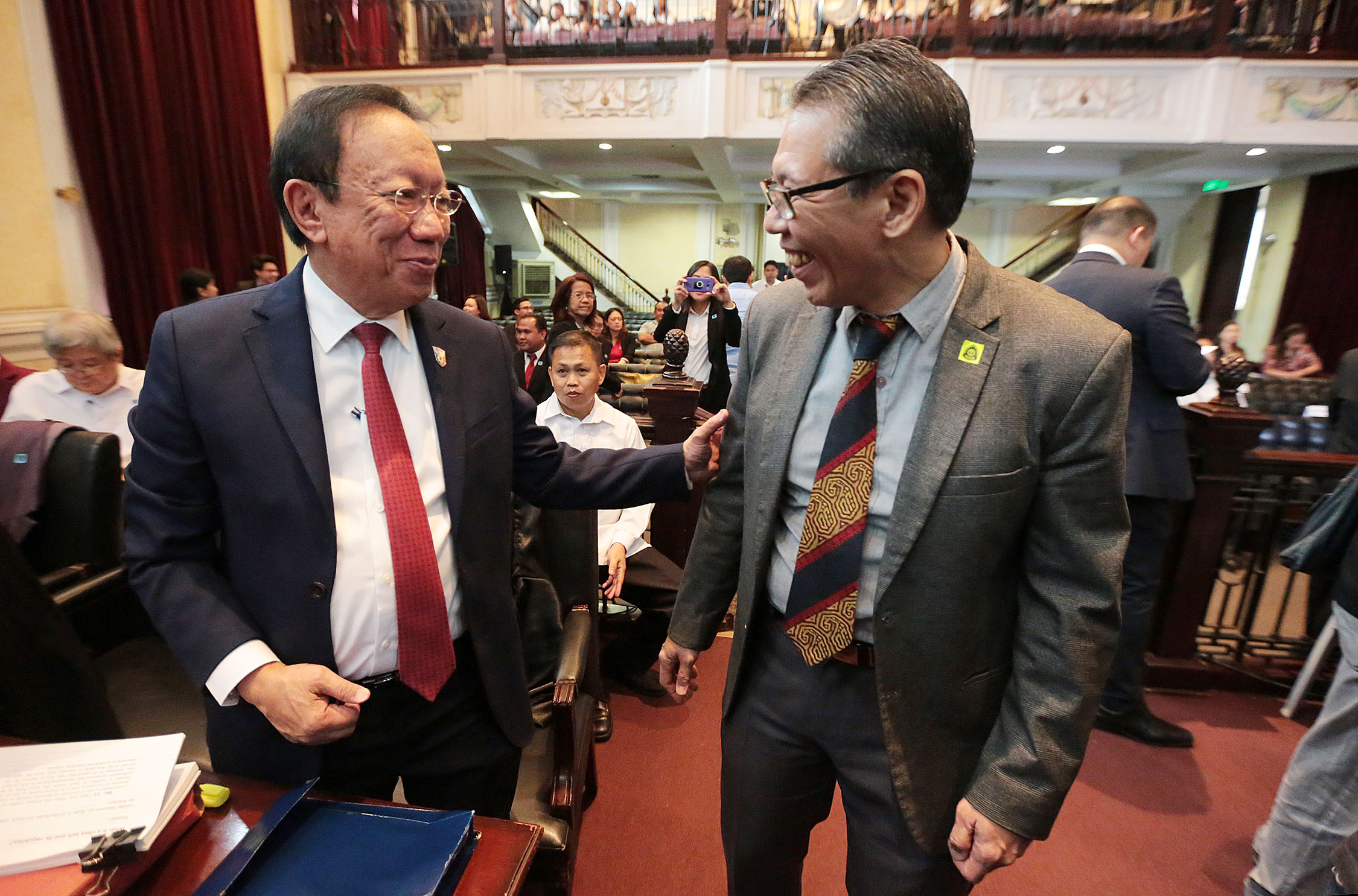Drug raids illegal, say 2 SC justices

ORAL ARGUMENTS Solicitor General Jose Calida and human rights lawyer Jose Manuel Diokno share a light moment before the start of oral arguments on the Duterte administration’s war on drugs at the Supreme Court on Tuesday. —GRIG C. MONTEGRANDE
Police raids on houses of drug suspects without judicial warrants violated the antitorture law and other individual rights enshrined in the 1987 Constitution, two Supreme Court justices said on Tuesday.
At the opening of oral arguments in two petitions challenging President Duterte’s brutal war on drugs, Associate Justice Marvic Leonen asked human rights lawyer Jose Manuel Diokno, who represented some of the petitioners, about incidents of policemen barging into the houses of drug suspects without court orders.
Diokno, of the Free Legal Assistance Group, brought the petition to stop the police raids on behalf of a survivor and two other people whose relatives were slain by police in the war on drugs.
Another group of petitioners, represented by Joel Butuyan of the Center for International Law, brought a class suit against the Philippine National Police seeking Supreme Court intervention to keep their neighborhood in San Andres Bukid, Manila, safe from policemen who have allegedly killed 35 residents of the impoverished community since the war on drugs began last year.
Answering Leonen’s questions, Diokno said policemen who conducted warrantless house searches violated the right of citizens to be presumed innocent and the right against unreasonable search and seizure as defined under Article III of the 1987 Constitution.
Article continues after this advertisementDissecting the police operational procedures, Leonen questioned Diokno on how the PNP implemented “Oplan Tokhang” — the main vehicle of Mr. Duterte’s crackdown on illegal drugs—based on the experiences of Diokno’s clients.
Article continues after this advertisement“If a suspect does not open the door, what happens to the suspect? If you do not open the door, something will happen to you, is it not correct? So therefore, there is a threat?” Leonen asked Diokno.
Leonen pointed out that police entry into the houses of drug suspects effectively placed them under custodial investigation without the assistance of a lawyer in violation of the law.
“When somebody is under a coercive process to make that person actually do something, as in this case open the door to the police, let them in, make them do whatever, then therefore under pain of coercion then that in fact is torture according to the law,” he said.
Orders unconstitutional
“Is it possible that there is a violation of the Constitution immediately because of how Oplan Tokhang is imagined in the [PNP] circular? And that is a violation of the right against self-incrimination and right to custodial interrogation,” he said.
Diokno answered in the affirmative and claimed that the supposed unlawful acts of police officers were allowed by the issuance of PNP Command Memorandum Circular No. 16–2016 and the Department of the Interior and Local Government (DILG) Memorandum Circular No. 2017-112.
He argued that the DILG and PNP orders should be declared unconstitutional for using the words “neutralize” and “negation,” whose vague definitions only encouraged policemen to kill drug suspects and resort to “shortcuts” in dealing with the drug menace.
“It expressly authorized the police to kill [drug suspects] in the guise of neutralizing or negating them without the benefit of trial and due process of law in violation of the Bill of Rights,” Diokno said.
“The only true and lasting solution to rampant crimes is to strengthen the justice system, not to supplant it with justice that emanates from the barrels of guns,” he added.
Senior Associate Justice Antonio Carpio said policemen who conducted a case buildup against drug suspects who refused them entry could be held liable for violating the suspects’ right to privacy.
“A citizen has the right to refuse entry [to the police] if there is no search warrant,” Diokno insisted.
14,000 drug killings
Butuyan, the lawyer for the petitioners from San Andres Bukid, said the unabated drug killings in the country, which rights groups say now number about 14,000, started right after Mr. Duterte won the presidency and following the issuance of the DILG and PNP circulars.
“Never in our history as a people has it happened that state agents, our police, admitted to being responsible for thousands of civilian killings and never in our history as a country has thousands of killings been justified on the basis of a government circular,” Butuyan said.
The high tribunal summoned PNP chief Ronald dela Rosa, Interior Undersecretary Catalino Cuy, Philippine Drug Enforcement Agency Director General Aaron Aquino and Dangerous Drugs Board official Marlowe Pedregosa to show up at the continuation of the oral arguments on Nov. 28.
Also directed to attend the next hearing were National Police Commission Vice Chair and Executive Officer Rogelio Casurao and PNP Internal Affairs Service chief Alfegar Triambulo.